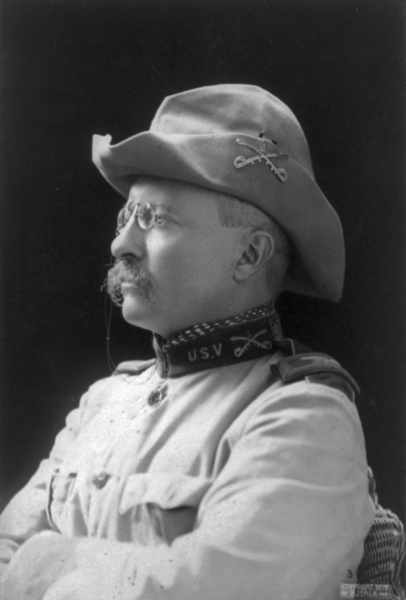The Theodore Roosevelt Big Stick foreign policy refers to an oft-repeated quote attributed to him: “Speak softly and carry a big stick; you will go far.” Also referred to as the Theodore Roosevelt Big Stick diplomacy, this philosophy embodies the idea of peaceful negotiation (to ‘speak softly’) coupled with the simultaneous threat of military force (the ‘big stick’).
Despite the seeming newness of the Theodore Roosevelt Big Stick policy, it was very similar to Realpolitik. This word, invented in the 19th century by German writer and politician Ludwig von Rochau, means politics (or diplomacy) based on power, with only practical and material factors being considered – instead of ideological, moralistic, or ethical factors. Many times, when something is referred to as being realpolitik in nature, it has connotations of coercion, including amoral or Machiavellian (cunning and deceptive) methods. Obviously, Teddy’s Big Stick policy wasn’t always received in the warmest light, leading to highly-polarized divisions among his colleagues, political adversaries, friends, and family.
When he first used the quote during a speech on September 2, 1901, Teddy was at the Minnesota State Fair. Strangely, four days later, President William McKinley was assassinated (dying eight days later, on September 14), which led to Roosevelt assuming the role as president. Although he had used the same phrase in a letter to Henry W. Sprague (Union League Club) more than a year earlier, at that time, Teddy claimed it was a West African proverb, which lent itself as proof of his admirable reading habits.
This policy was used in later dealings during Roosevelt’s presidency, during the Anthracite Coal Strike of 1902. Miners led by John Mitchell, who formed the United Mine Workers (UMW) decided to strike because they wanted higher pay rates, better housing, and shorter working hours. The companies refused, and contacted Roosevelt. Before, the government would have sent the military to force the workers to end the strike, but Theodore held a meeting at the White House, instead. After the meeting, the miners decided to continue with their strike, so Teddy ordered the military to enter and run the mines in the interest of the public. Because the mining companies were furious about not being able to make direct profits (due to military involvement) they finally gave in to the UMW demands. The policy from this incident was later named the “Square Deal”.
The “big stick” policy was also used in the Venezuelan Affair of 1902, the Roosevelt Corollary of 1905, the “Canal Diplomacy” (including the attempted Nicaragua Canal and subsequent Panama Canal construction), and the Platt Amendment regarding the annexation of Cuba. Interestingly, after this failed attempt at the Cuba annexation, even Theodore Roosevelt, “big stick” inventor and proponent, was totally enraged by the failure of the U.S. to obtain what he (and others) felt ‘belonged’ to the country.

